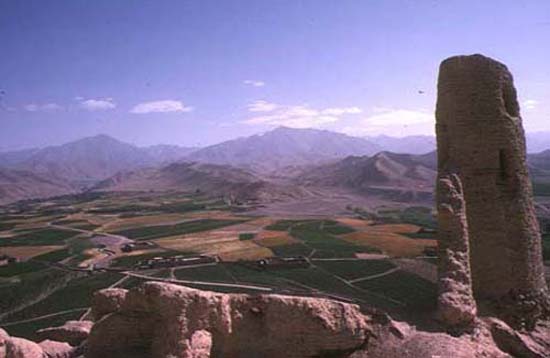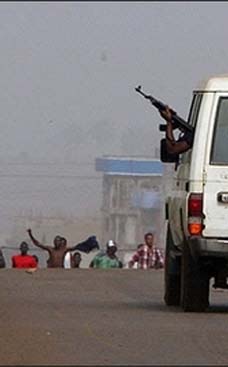2006.12.12: December 12, 2006: Headlines: COS - Afghanistan: Military: Military.com: U.S. Army Staff Sergeant Clint Douglas, a former Peace Corps volunteer, was deployed to Afghanistan with the 20th Special Forces Group (Airborne), Illinois National Guard, for more than six months
Peace Corps Online:
Directory:
Afghanistan:
Peace Corps Afghanistan:
Peace Corps Afghanistan: Newest Stories:
2006.12.12: December 12, 2006: Headlines: COS - Afghanistan: Military: Military.com: U.S. Army Staff Sergeant Clint Douglas, a former Peace Corps volunteer, was deployed to Afghanistan with the 20th Special Forces Group (Airborne), Illinois National Guard, for more than six months
U.S. Army Staff Sergeant Clint Douglas, a former Peace Corps volunteer, was deployed to Afghanistan with the 20th Special Forces Group (Airborne), Illinois National Guard, for more than six months

"Now, I had never in my pitiful life knowingly exchanged pleasantries over lunch, or any other meal for that matter, with a man who was regularly trying to kill me. But when Bill invited me to escort him to the castle for his first meeting with Audin, I jumped at the opportunity. The idea seemed so elegant, like the medieval Spaniards and Moors retiring to each other's tents to play chess and exchange bons mots after a bloody day of battle and slaughter. Perhaps the metaphor was unnecessary; we would, after all, be departing from our own high-walled mud fortress to visit another, albeit grander one. We were literally making a kind of feudal social call. This situation, however, was less straightforward; Zia Audin was technically on our side. And anyway, I really wanted to see the inside of that castle".
U.S. Army Staff Sergeant Clint Douglas, a former Peace Corps volunteer, was deployed to Afghanistan with the 20th Special Forces Group (Airborne), Illinois National Guard, for more than six months
LUNCH WITH PIRATES
(Personal Narrative)
Staff Sergeant Clint Douglas
Commentary: Before embarking overseas, many U.S. troops receive cultural sensitivity briefings so that they do not inadvertently offend the civilians and allied military personnel they meet in Afghanistan and Iraq. No matter how much preparation servicemen and women are given, however, they will inevitably find themselves in situations for which there is simply no training manual or reference guide. In March 2003, thirty-four-year-old U.S. Army Staff Sergeant Clint Douglas, a former Peace Corps volunteer, was deployed to Afghanistan with the 20th Special Forces Group (Airborne), Illinois National Guard, for more than six months. Douglas quickly discovered that beneath the patina of social niceties and expressions of mutual regard, some associations and alliances with local leaders were considerably more complicated than they initially appeared. Douglas"s "Lunch with Pirates" is quite simply a masterpiece, and the following excerpt is just a small sliver from the much larger and more compelling story in "Operation Homecoming" that is humorous, surreal, and at times terrifying.
Overall we worked well with the provincial officials appointed by Afghan President Hamid Karzai. Like Karzai himself, they owed their positions and their continuing survival to the strength of our arms. Without us they were all dead men. But the most peculiar, if not spectacularly bizarre, of all of our relationships was that with Zia Audin, the local warlord in Gardez. It was one of distrust, conspiracy, and mutual antipathy. We endured a dysfunctional marriage of convenience, but divorce was difficult and we couldn"t just get rid of him. The few men that he still controlled were encamped at several different bases around the city, but his real power emanated from the Bala Hissar, or Castle Greyskull as we called it, a massive fortification built by the British in the nineteenth century in the middle of Gardez. It dwarfed all of the other structures in town and dominated the entire mountain plain that surrounded the city.
Zia Audin, sorry, General Zia Audin, was responsible for many of the rocket attacks on our firebase and at least some of the IEDs that exploded around our patrols. All of the American and Afghan agencies around the region knew this, and most interestingly Zia Audin knew that we knew. But he didn"t try to kill us out of a sense of either hatred or malice in his heart; he did it out of jealousy and pride, for Zia Audin was heartbroken. He suffered from an unrequited love of America, and this was awkward for all parties. So Zia Audin, in a fit of adolescent pique, did what came naturally -- he tried to kill us".
Lunching with Zia Audin was a ritualistic courtesy, demanded by custom and protocol. The first time that I"d heard of such an absurdity was during a conversation with one of our predecessors at the Gardez firebase.
"You"ve actually had lunch with him"" I asked, shocked.
"Oh, yeah, sure. I"ve been up there a couple of times," he shrugged.
"Have I been reading the wrong intelligence reports or something" Did I miss a meeting" Are we talking about the same Zia Audin, the Zia Audin" The jackass who attacks our convoys, mortars our firebase, and who might be working with the Taliban"" I demanded, as I counted off his sins.
"That would be the one. It"s just expected. You go up to Castle Greyskull occasionally and have lunch with him. You still have to talk to him, and anyway he puts on a nice spread of chow. If you get a chance to go up there, take it. You won"t be disappointed," he said, obviously relishing the irony of the situation.
"Now, I had never in my pitiful life knowingly exchanged pleasantries over lunch, or any other meal for that matter, with a man who was regularly trying to kill me. But when Bill invited me to escort him to the castle for his first meeting with Audin, I jumped at the opportunity. The idea seemed so elegant, like the medieval Spaniards and Moors retiring to each other"s tents to play chess and exchange bons mots after a bloody day of battle and slaughter. Perhaps the metaphor was unnecessary; we would, after all, be departing from our own high-walled mud fortress to visit another, albeit grander one. We were literally making a kind of feudal social call. This situation, however, was less straightforward; Zia Audin was technically on our side. And anyway, I really wanted to see the inside of that castle".
" "OPERATION HOMECOMING: Iraq, Afghanistan, and the Home Front, in the Words of U.S. Troops and Their Families" (Random House, 2006), edited by Andrew Carroll.
Links to Related Topics (Tags):
Headlines: December, 2006; Peace Corps Afghanistan; Directory of Afghanistan RPCVs; Messages and Announcements for Afghanistan RPCVs; Military
When this story was posted in March 2007, this was on the front page of PCOL:





Peace Corps Online The Independent News Forum serving Returned Peace Corps Volunteers
 | Chris Dodd's Vision for the Peace Corps
Senator Chris Dodd (RPCV Dominican Republic) spoke at the ceremony for this year's Shriver Award and elaborated on issues he raised at Ron Tschetter's hearings. Dodd plans to introduce legislation that may include: setting aside a portion of Peace Corps' budget as seed money for demonstration projects and third goal activities (after adjusting the annual budget upward to accommodate the added expense), more volunteer input into Peace Corps operations, removing medical, healthcare and tax impediments that discourage older volunteers, providing more transparency in the medical screening and appeals process, a more comprehensive health safety net for recently-returned volunteers, and authorizing volunteers to accept, under certain circumstances, private donations to support their development projects. He plans to circulate draft legislation for review to members of the Peace Corps community and welcomes RPCV comments. |
 | He served with honor
One year ago, Staff Sgt. Robert J. Paul (RPCV Kenya) carried on an ongoing dialog on this website on the military and the peace corps and his role as a member of a Civil Affairs Team in Iraq and Afghanistan. We have just received a report that Sargeant Paul has been killed by a car bomb in Kabul. Words cannot express our feeling of loss for this tremendous injury to the entire RPCV community. Most of us didn't know him personally but we knew him from his words. Our thoughts go out to his family and friends. He was one of ours and he served with honor. |
 | Peace Corps' Screening and Medical Clearance
The purpose of Peace Corps' screening and medical clearance process is to ensure safe accommodation for applicants and minimize undue risk exposure for volunteers to allow PCVS to complete their service without compromising their entry health status. To further these goals, PCOL has obtained a copy of the Peace Corps Screening Guidelines Manual through the Freedom of Information Act (FOIA) and has posted it in the "Peace Corps Library." Applicants and Medical Professionals (especially those who have already served as volunteers) are urged to review the guidelines and leave their comments and suggestions. Then read the story of one RPCV's journey through medical screening and his suggestions for changes to the process. |
 | The Peace Corps is "fashionable" again
The LA Times says that "the Peace Corps is booming again and "It's hard to know exactly what's behind the resurgence." PCOL Comment: Since the founding of the Peace Corps 45 years ago, Americans have answered Kennedy's call: "Ask not what your country can do for you--ask what you can do for your country. My fellow citizens of the world: ask not what America will do for you, but what together we can do for the freedom of man." Over 182,000 have served. Another 200,000 have applied and been unable to serve because of lack of Congressional funding. The Peace Corps has never gone out of fashion. It's Congress that hasn't been keeping pace. |
 | PCOL readership increases 100%
Monthly readership on "Peace Corps Online" has increased in the past twelve months to 350,000 visitors - over eleven thousand every day - a 100% increase since this time last year. Thanks again, RPCVs and Friends of the Peace Corps, for making PCOL your source of information for the Peace Corps community. And thanks for supporting the Peace Corps Library and History of the Peace Corps. Stay tuned, the best is yet to come. |
 | History of the Peace Corps
PCOL is proud to announce that Phase One of the "History of the Peace Corps" is now available online. This installment includes over 5,000 pages of primary source documents from the archives of the Peace Corps including every issue of "Peace Corps News," "Peace Corps Times," "Peace Corps Volunteer," "Action Update," and every annual report of the Peace Corps to Congress since 1961. "Ask Not" is an ongoing project. Read how you can help. |
Read the stories and leave your comments.

Some postings on Peace Corps Online are provided to the individual members of this group without permission of the copyright owner for the non-profit purposes of criticism, comment, education, scholarship, and research under the "Fair Use" provisions of U.S. Government copyright laws and they may not be distributed further without permission of the copyright owner. Peace Corps Online does not vouch for the accuracy of the content of the postings, which is the sole responsibility of the copyright holder.
Story Source: Military.com
This story has been posted in the following forums: : Headlines; COS - Afghanistan; Military
PCOL35458
64

















